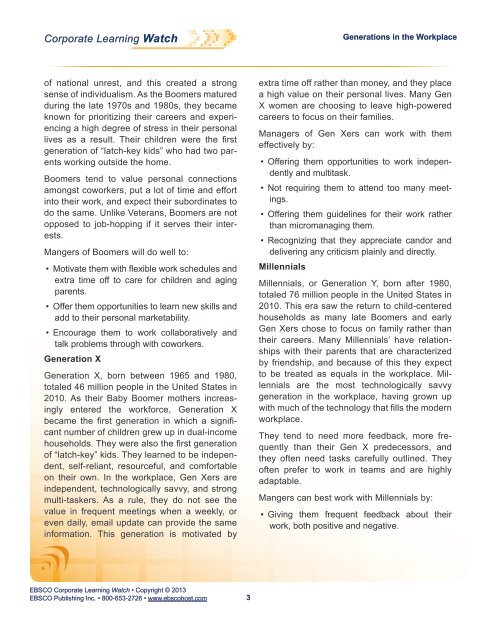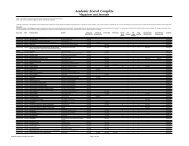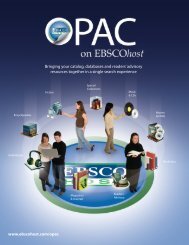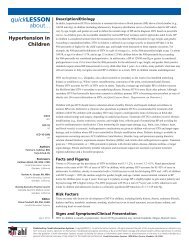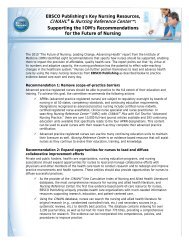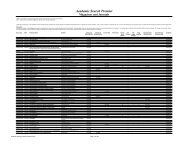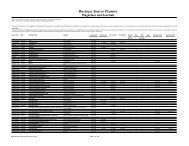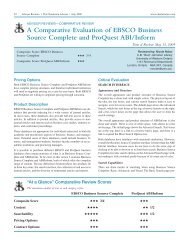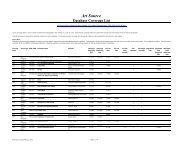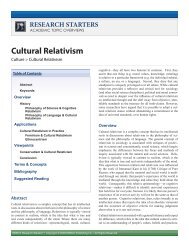Generations in the Workplace - EBSCO Publishing
Generations in the Workplace - EBSCO Publishing
Generations in the Workplace - EBSCO Publishing
You also want an ePaper? Increase the reach of your titles
YUMPU automatically turns print PDFs into web optimized ePapers that Google loves.
Corporate Learn<strong>in</strong>g Watch<br />
<strong>Generations</strong> <strong>in</strong> <strong>the</strong> <strong>Workplace</strong><br />
of national unrest, and this created a strong<br />
sense of <strong>in</strong>dividualism. As <strong>the</strong> Boomers matured<br />
dur<strong>in</strong>g <strong>the</strong> late 1970s and 1980s, <strong>the</strong>y became<br />
known for prioritiz<strong>in</strong>g <strong>the</strong>ir careers and experienc<strong>in</strong>g<br />
a high degree of stress <strong>in</strong> <strong>the</strong>ir personal<br />
lives as a result. Their children were <strong>the</strong> first<br />
generation of “latch-key kids” who had two parents<br />
work<strong>in</strong>g outside <strong>the</strong> home.<br />
Boomers tend to value personal connections<br />
amongst coworkers, put a lot of time and effort<br />
<strong>in</strong>to <strong>the</strong>ir work, and expect <strong>the</strong>ir subord<strong>in</strong>ates to<br />
do <strong>the</strong> same. Unlike Veterans, Boomers are not<br />
opposed to job-hopp<strong>in</strong>g if it serves <strong>the</strong>ir <strong>in</strong>terests.<br />
Mangers of Boomers will do well to:<br />
• Motivate <strong>the</strong>m with flexible work schedules and<br />
extra time off to care for children and ag<strong>in</strong>g<br />
parents.<br />
• Offer <strong>the</strong>m opportunities to learn new skills and<br />
add to <strong>the</strong>ir personal marketability.<br />
• Encourage <strong>the</strong>m to work collaboratively and<br />
talk problems through with coworkers.<br />
Generation X<br />
Generation X, born between 1965 and 1980,<br />
totaled 46 million people <strong>in</strong> <strong>the</strong> United States <strong>in</strong><br />
2010. As <strong>the</strong>ir Baby Boomer mo<strong>the</strong>rs <strong>in</strong>creas<strong>in</strong>gly<br />
entered <strong>the</strong> workforce, Generation X<br />
became <strong>the</strong> first generation <strong>in</strong> which a significant<br />
number of children grew up <strong>in</strong> dual-<strong>in</strong>come<br />
households. They were also <strong>the</strong> first generation<br />
of “latch-key” kids. They learned to be <strong>in</strong>dependent,<br />
self-reliant, resourceful, and comfortable<br />
on <strong>the</strong>ir own. In <strong>the</strong> workplace, Gen Xers are<br />
<strong>in</strong>dependent, technologically savvy, and strong<br />
multi-taskers. As a rule, <strong>the</strong>y do not see <strong>the</strong><br />
value <strong>in</strong> frequent meet<strong>in</strong>gs when a weekly, or<br />
even daily, email update can provide <strong>the</strong> same<br />
<strong>in</strong>formation. This generation is motivated by<br />
extra time off ra<strong>the</strong>r than money, and <strong>the</strong>y place<br />
a high value on <strong>the</strong>ir personal lives. Many Gen<br />
X women are choos<strong>in</strong>g to leave high-powered<br />
careers to focus on <strong>the</strong>ir families.<br />
Managers of Gen Xers can work with <strong>the</strong>m<br />
effectively by:<br />
• Offer<strong>in</strong>g <strong>the</strong>m opportunities to work <strong>in</strong>dependently<br />
and multitask.<br />
• Not requir<strong>in</strong>g <strong>the</strong>m to attend too many meet<strong>in</strong>gs.<br />
• Offer<strong>in</strong>g <strong>the</strong>m guidel<strong>in</strong>es for <strong>the</strong>ir work ra<strong>the</strong>r<br />
than micromanag<strong>in</strong>g <strong>the</strong>m.<br />
• Recogniz<strong>in</strong>g that <strong>the</strong>y appreciate candor and<br />
deliver<strong>in</strong>g any criticism pla<strong>in</strong>ly and directly.<br />
Millennials<br />
Millennials, or Generation Y, born after 1980,<br />
totaled 76 million people <strong>in</strong> <strong>the</strong> United States <strong>in</strong><br />
2010. This era saw <strong>the</strong> return to child-centered<br />
households as many late Boomers and early<br />
Gen Xers chose to focus on family ra<strong>the</strong>r than<br />
<strong>the</strong>ir careers. Many Millennials’ have relationships<br />
with <strong>the</strong>ir parents that are characterized<br />
by friendship, and because of this <strong>the</strong>y expect<br />
to be treated as equals <strong>in</strong> <strong>the</strong> workplace. Millennials<br />
are <strong>the</strong> most technologically savvy<br />
generation <strong>in</strong> <strong>the</strong> workplace, hav<strong>in</strong>g grown up<br />
with much of <strong>the</strong> technology that fills <strong>the</strong> modern<br />
workplace.<br />
They tend to need more feedback, more frequently<br />
than <strong>the</strong>ir Gen X predecessors, and<br />
<strong>the</strong>y often need tasks carefully outl<strong>in</strong>ed. They<br />
often prefer to work <strong>in</strong> teams and are highly<br />
adaptable.<br />
Mangers can best work with Millennials by:<br />
• Giv<strong>in</strong>g <strong>the</strong>m frequent feedback about <strong>the</strong>ir<br />
work, both positive and negative.<br />
<strong>EBSCO</strong> Corporate Learn<strong>in</strong>g Watch • Copyright © 2013<br />
<strong>EBSCO</strong> Publish<strong>in</strong>g Inc. • 800-653-2726 • www.ebscohost.com<br />
3


